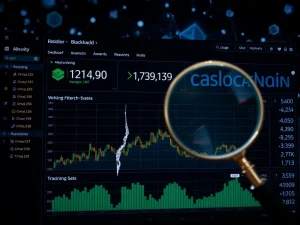Bitgo’s Pivotal Entry: Empowering Brazilian Banks with Secure Digital Assets

The world of finance is constantly evolving, and nowhere is this more evident than in the rapid adoption of digital assets. For institutions looking to navigate this new frontier, secure and compliant infrastructure is paramount. This is precisely where Bitgo, a leading cryptocurrency custodian and technology solutions provider, is making a significant move. Bitgo’s recent expansion into Brazil marks a pivotal moment, positioning the firm to help Brazilian banks integrate digital assets into their service portfolios, transforming the financial landscape.
Why Brazil? A Fertile Ground for Digital Assets
Brazil’s financial sector is undergoing a remarkable transformation, becoming an increasingly attractive hub for digital asset innovation. What makes Brazil such a strategic market for Bitgo’s expansion?
-
Regulatory Clarity: The Central Bank of Brazil has been proactive in establishing a formal licensing regime for crypto custodians, with plans for implementation by 2025. This regulatory progress is a powerful catalyst, providing the necessary framework for traditional financial institutions to confidently explore crypto offerings.
-
Institutional Demand: As regulatory clarity emerges, there’s a growing appetite among Brazilian banks to embrace digital assets. They recognize the potential to diversify services, meet evolving customer demands, and leverage blockchain technology for efficiency.
-
Market Dynamics: Brazil’s vibrant economy and tech-savvy population create a ripe environment for crypto adoption, driving both retail and institutional interest.
This convergence of regulatory advancements and market dynamics creates a fertile ground for firms like Bitgo, which can bridge the gap between traditional finance and the emerging digital asset ecosystem.
Bitgo’s Solutions: Powering Brazilian Banks Crypto Adoption
Bitgo’s strategic entry is not just about presence; it’s about providing tailored solutions that address the core needs of Brazilian banks as they venture into digital assets. The firm’s offerings are designed to tackle the technical and regulatory complexities institutions face, ensuring secure and compliant operations.
Bitgo aims to:
-
Provide Secure Crypto Custody: At the heart of Bitgo’s offering is institutional-grade secure custody. This is crucial for banks, which prioritize risk mitigation and asset protection above all else. Bitgo’s robust security frameworks are designed to meet the stringent requirements of traditional financial institutions.
-
Ensure Compliance Frameworks: Navigating the evolving regulatory landscape is a significant challenge. Bitgo offers compliance tools and expertise, enabling banks to manage crypto transactions and secure assets within Brazil’s legal boundaries, aligning with anticipated licensing regimes.
-
Facilitate Blockchain Integration: Beyond custody, Bitgo provides tools for seamless blockchain integration. This allows banks to manage crypto transactions efficiently, reduce operational friction, and enhance transparency, preparing them for future applications like asset tokenization and DeFi.
By embedding its technology into local banks’ systems, Bitgo is not just offering a service; it’s building foundational infrastructure for Brazil’s crypto ecosystem.
Navigating the Landscape: Challenges for Institutional Crypto in Brazil
While the outlook for Bitgo Brazil is promising, the journey isn’t without its hurdles. The nascent institutional crypto market in Brazil still presents significant challenges:
-
Lingering Regulatory Uncertainties: Despite progress, some ambiguities may persist as the licensing regime is fully implemented. Bitgo will need to remain agile, adapting its solutions to evolving local conditions.
-
Infrastructure Gaps: While Brazil is advancing, certain infrastructure elements may still require development to fully support a mature institutional digital asset market.
-
Competition: The market is becoming increasingly competitive, with regional crypto exchanges and fintech platforms vying for market share. Bitgo’s differentiation will lie in its unwavering focus on institutional-grade security, compliance, and deep integration capabilities, setting it apart from less regulated players.
Bitgo’s emphasis on building credibility and trust with stakeholders, coupled with its global expertise, will be key to overcoming these challenges.
Strategic Timing: Seizing the Moment for Institutional Crypto Growth
The timing of Bitgo’s entry into Brazil is strategically advantageous. With regulators signaling a cautious yet open approach to crypto, the firm is perfectly positioned to assist banks in navigating the evolving legal landscape. The anticipated licensing regime for crypto custodians by 2025 is expected to accelerate institutional participation, creating a crucial window for Bitgo to solidify its role as a key infrastructure provider.
By offering tools that align with regulatory expectations while delivering cutting-edge solutions, Bitgo is actively shaping the foundational architecture of Brazil’s burgeoning digital asset ecosystem. This move aligns with broader global trends, where banks are increasingly leveraging blockchain for various applications, from cross-border payments to decentralized finance (DeFi).
The Future is Digital: A Model for Global Crypto Adoption
Bitgo’s foray into Brazil marks a significant milestone for the country’s financial sector and serves as a powerful testament to the growing legitimacy of crypto as a mainstream asset class. As Brazilian banks increasingly recognize the immense potential of digital assets to diversify services and meet customer demand, partnerships with robust crypto infrastructure providers like Bitgo are becoming absolutely pivotal.
This expansion not only reinforces the necessity of secure, compliant infrastructure in driving widespread adoption but also highlights a model for future collaborations between global crypto firms and emerging financial hubs. With Brazil’s market poised for substantial growth, Bitgo’s strategic move could well serve as a blueprint for institutional crypto integration across other developing economies.
Frequently Asked Questions (FAQs)
Q1: What is Bitgo’s primary objective in expanding to Brazil?
Bitgo’s primary objective in Brazil is to target banks and financial institutions that are looking to integrate digital assets into their service portfolios. They aim to provide secure custody, compliance frameworks, and blockchain integration tools to bridge traditional banking with emerging digital asset ecosystems.
Q2: How will Bitgo help Brazilian banks with digital asset adoption?
Bitgo will help Brazilian banks by offering institutional-grade secure crypto custody solutions, providing compliance frameworks to navigate local regulations, and facilitating blockchain integration to manage crypto transactions efficiently and securely within legal boundaries.
Q3: What regulatory developments in Brazil are driving this expansion?
The Central Bank of Brazil has initiated measures to establish a formal licensing regime for crypto custodians, with plans to implement these by 2025. This regulatory clarity is a key driver, spurring banks to explore crypto offerings and seek trusted partners like Bitgo.
Q4: What challenges might Bitgo face in the Brazilian market?
Bitgo might face challenges such as lingering regulatory uncertainties, potential infrastructure gaps in the nascent institutional crypto market, and competition from regional crypto exchanges and fintech platforms. However, its focus on institutional-grade services aims to differentiate it.
Q5: Why is the timing of Bitgo’s entry into Brazil considered strategic?
The timing is strategic because Brazil’s regulators are signaling an open approach to crypto, and the anticipated licensing regime by 2025 is expected to accelerate institutional participation. This allows Bitgo to establish itself as a key infrastructure provider while the market is still developing and poised for significant growth.









